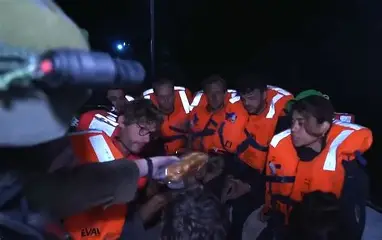Israeli forces have intercepted a flotilla of ships carrying aid toward Gaza and detained hundreds of activists on board, including Swedish climate campaigner Greta Thunberg, in a dramatic escalation of international tensions surrounding the blockade of the Palestinian territory.
According to Israel’s Foreign Ministry, those detained from the so-called Global Sumud Flotilla (GSF) are being transferred to the Israeli port of Ashdod, where they will face deportation. Organizers said more than 443 people were taken into custody after their boats were stopped, some in international waters around 70 nautical miles off Gaza’s coast and others closer to shore.
Israel insisted that its navy had acted lawfully, telling the vessels they were approaching “an active combat zone” and violating a naval blockade it has enforced for years. In contrast, flotilla organizers described the move as “illegal” and “a brazen act of desperation,” alleging that passengers had been assaulted with water cannons during the seizures.
The incident has provoked an immediate international backlash. South African President Cyril Ramaphosa condemned the interception as a violation of international law and the sovereignty of nations whose flags the flotilla carried. Turkey’s foreign ministry labeled the actions “an act of terrorism” and demanded accountability.
In Bogotá, Colombian President Gustavo Petro went further, announcing the expulsion of all Israeli diplomats from the country and the termination of a free trade agreement signed with Israel in 2020. Petro denounced the interceptions as “an international crime by Netanyahu” and demanded the release of two Colombian citizens detained aboard the vessels.
By contrast, Italy’s Prime Minister Giorgia Meloni criticized the flotilla’s attempt to reach Gaza, arguing that “all this brings no benefit to the Palestinian people.” Italy’s main trade union, CGIL, however, announced it would stage a general strike on Friday in solidarity with Gaza and in protest against what it described as the abandonment of Italian citizens “in open international waters.”
Footage released by Israel’s Foreign Ministry showed Thunberg seated calmly on the deck of a boat as Israeli forces provided her with water and a jacket. Officials said all those detained were “safe and in good health,” adding: “Greta and her friends are safe and healthy.”
Amnesty International strongly condemned the blockade, calling it “unlawful” and accusing Israel of decades of “blatant violations of international law.” The group urged an immediate end to what it described as “systematic obstruction of humanitarian aid.”
Protests erupted in cities across Europe, North Africa, and the Middle East in response to the incident. Demonstrations were reported in Greece, Italy, Germany, Tunisia, and Turkey, as well as in Pakistan, Bolivia, and Malaysia. Activists carried placards denouncing the blockade and calling for an end to the Gaza siege.
The United Nations also weighed in. High Commissioner for Human Rights Volker Türk urged Israel to lift the blockade “urgently” and allow the flow of life-saving aid, warning that international humanitarian law requires impartial relief without hindrance.
Ireland’s Deputy Prime Minister Simon Harris confirmed that at least seven Irish citizens, including Sinn Féin senator Chris Andrews, were among those detained. He said he expected Israel to uphold international law. Meanwhile, the UK Foreign Office said it was in contact with the families of British nationals aboard the flotilla and had made representations to Israeli authorities.
The flotilla departed Spain a month ago, comprising more than 40 vessels and around 500 passengers, including European parliamentarians, lawyers, and activists. Its stated mission was to deliver humanitarian aid directly to Gaza, bypassing Israeli checkpoints. Israel has blocked two similar attempts this year, in June and July.
Israeli officials dismissed the mission as a “selfie yacht” publicity stunt. Thunberg rejected that characterization, telling the BBC earlier this week: “I don’t think anyone would risk their life for a publicity stunt.”
International aid groups have long accused Israel of restricting humanitarian supplies to Gaza. The Israeli government insists the blockade is necessary to prevent weapons from reaching Hamas, while critics argue that food and medicine are being withheld from civilians.
A UN-backed body, the Integrated Food Security Phase Classification (IPC), declared last month that Gaza was facing famine, attributing the crisis directly to Israeli restrictions. UN humanitarian chief Martin Griffiths echoed that assessment, accusing Israel of “systematic obstruction.” Prime Minister Benjamin Netanyahu dismissed the findings as “an outright lie.”
The standoff over the flotilla is likely to intensify debate over Israel’s blockade policy, raising fresh questions about the balance between security concerns and humanitarian obligations. For now, the image of Thunberg and hundreds of other activists detained on the high seas underscores the widening rift between Israel and much of the international community.



